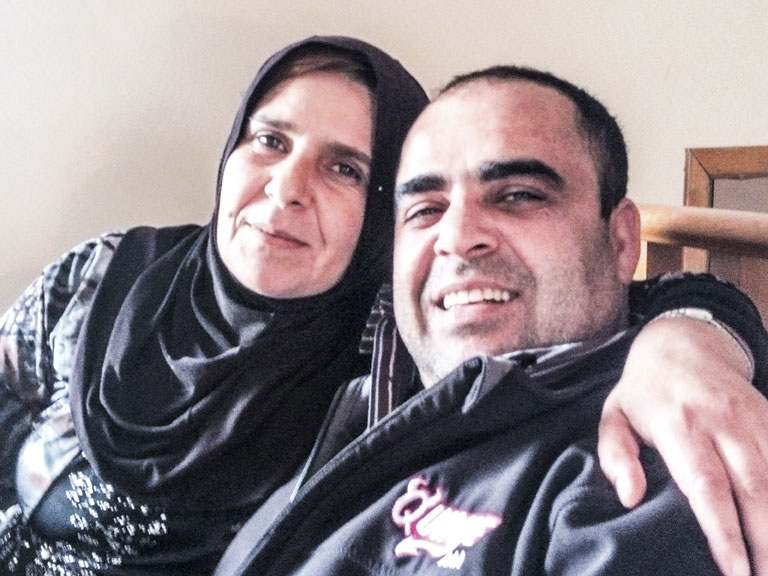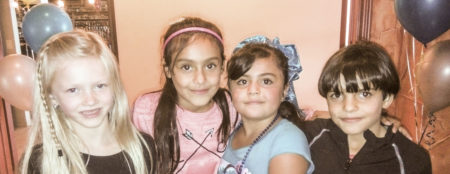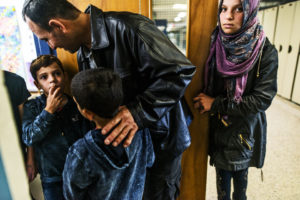County News
One year on

War ravaged families adjusting to life in Canada, yet mourn for those left behind
STORY: ROBIN BARANYAI
Prince Edward County has always been a caring community. People look out for their neighbours. They pull together to build playgrounds and arenas. They organize parades. It is an extraordinarily giving place.
Last year, this community embarked on a remarkable journey. In the fall, PEC Syria came together to develop a community response to the crisis in Syria. Led by Carlyn Moulton and Kathleen Powderley, we partnered with the Ryerson University Lifeline Syria Challenge, a volunteer organization with charitable status and resettlement expertise.
Ryerson’s focus is resettling Syrian families in Toronto, but it was seeking a better fit for a large, multigenerational family of 14. They found it in Prince Edward County. In six weeks, volunteers readied a house and stocked the pantry.
ANNIVERSARY
It’s been a little over a year since the Al Jasem family arrived in the County on October 29, 2015. It was a long and uncertain journey for Abdel Malek and his wife, Sawsan. They were travelling with 11 children ranging in age from two to 19, and Abdel Malek’s 71-year-old mother, known to everyone as “Hadji” since she completed the pilgrimage to Mecca (Hajj).
Together, they spent four years in Lebanon —a country where the number of displaced Syrians has swelled to one-fifth of the population. It was a difficult life. The kids were not able to attend school. Refugees had to pay residency renewal fees. The family worked hard just to remain in the country, but found they were resented for taking local jobs.
When they learned they were coming to Canada, the Al Jasems didn’t know what to expect, but they had high hopes for a better life. When their second-eldest son Ramez stepped off the plane, he had been practising his first English words: “Go school now?”

(L-R) Iris, Anaam, Hwaya and Alaa at a baby shower for Nabiha al-Ahmad, anticipating her first Canadian-born child with husband Nasr Mostafa. A few days later, little Riad arrived, a baby brother for Anaam.
Today, the kids are all in school and thinking about the future. They’ve made friends in the community. Their presence has had a huge impact on many County kids. The older teens have shared their experiences in a model UN assembly and the Human Library project. They work part time while attending school.
Abdel Malek also divides his time between studying and working. A summer groundskeeping and gardening job has grown to encompass more and different responsibilities with the changing seasons.
The family members are adjusting well to life in Canada. They continually express gratitude for the way they have been welcomed by the community. But their first year in Canada has not been without difficulty. The hardest part, Sawsan says, is never seeing her home again.
Family knows no borders. From the moment of their arrival, their top concern was for loved ones still displaced by conflict. At times, the worry could be all-encompassing.
So PEC Syria held another public meeting. Asked if we could do more, the community broadened its embrace, with donors and volunteers coming forward to support Sawsan and Abdel Malek’s close relatives.
NEW ARRIVALS
A moment of joy came in February when Sawsan’s brother Nasr Mostafa arrived with his wife, Nabiha, and their five children.
The government initiative to resettle 25,000 Syrians was in full swing. The Mostafas and many others were kept in a hotel by the airport while their initial documents were processed. The Al Jasems made several trips out to the hotel, reassuring everyone Canada was a good place filled with kind people who wanted to help.
A complication ensued when government officials announced Nasr’s family was destined for Ottawa. Prince Edward County was not on the list of approved cities for resettlement, they said. After several trips back and forth, Carlyn persuaded the bureaucrats Prince Edward County had something the larger cities couldn’t offer: their family. It also had a committed team of volunteers ready to help them access health care, enrol in school and adjust to life in Canada.
Short weeks later, Sawsan and Nasr’s younger brother Adnan arrived with his wife, Suhaila, and their four kids. This time, the mandarins were easier to persuade. Brothers, sisters and cousins were happily reunited, creating an instant network of family support and mutual comfort.
DELAY
No sooner had these joyful reunions taken place when refugee processing unexpectedly ground to a halt. The federal government recalled scores of staff processing refugee applications in Lebanon and Turkey. Sponsor groups across Canada, answering the call to raise funds and make a home for new Syrian Canadians, were suddenly left in the lurch.
In nearby Tweed, the refugee sponsorship committee faced a tough choice. Their community had raised $27,000—enough to sponsor a family of four for a year—but lacked suitable housing. They made the difficult decision to abandon their application. After investigating other local resettlement efforts, the group generously added their support to the multi-family effort under way in Prince Edward County.
Funding was in place to support four additional applications. PEC Syria applied to sponsor Sawsan’s sister and three of Abdel Malek’s brothers, all registered with the United Nations refugee agency. The government vowed to restore some processing capacity, but movement has been slow.
The delays have caused a number of stresses. Apartments were furnished and readied, then sat empty so long, they had to be released. With a desire to help but no arrival in sight, some volunteers drifted from the organization. The sponsor families grew worried. But the greatest hardships, by far, have been borne by their families abroad. Some had begun divesting their possessions in anticipation of an imminent departure. Things shifted abruptly from standby to standstill.
The delay weighed heavily on Abdel Malek’s mother, waiting to be reunited with her sons. But Hadji’s health was failing. She spent eight days in hospital in the spring, surrounded by family. Around the clock they slept in chairs at her bedside. She passed peacefully on May 7. In keeping with Muslim tradition, she was buried by sundown, surrounded by new Canadian friends.
It was a deep loss for the family. Most of the kids had never known a time when they didn’t share a home with their grandmother.
But our friends are nothing if not resilient. They continued working hard, practising English and building a new life.
DOCUMENTARY
A few weeks earlier, they had all watched the documentary Queens of Syria at the Regent Theatre. New arrivals from other sponsor groups in Belleville attended as guests of honour for a rare opportunity to enjoy a movie in Arabic. Afterward Ramez said he enjoyed the film, but commented, “Our story is interesting. Why don’t they do a movie about us?”
In fact, some of Canada’s top documentary filmmakers had expressed an interest in exactly such a project. The award-winning team of Michèle Hozer and Roxana Spicer had won a provincial competition to make a documentary for Canada’s 150th birthday celebrations.
“As first generation Canadians ourselves, we share a very strong interest in the challenges and triumphs that go with the price of admission to Canada,” Michèle said. The crew is filming the Al Jasems and PEC Syria volunteers, documenting the way resettlement has transformed individual lives and enriched the community. They hope Prince Edward County’s story will inspire other Canadians when the documentary airs on TVO next fall.
HIGHS AND LOWS
Filming started at a spring potluck that brought the families together with volunteers and donors. Guests shared a beautiful array of Middle Eastern and Canadian dishes. Ramez helped DJ the event, kicking things off with his favourite song: O Canada.
An accomplished cook and mother of 11, Sawsan often prepares enough food for a small army. This summer at the Free Food Festival in Benson Park, pans of rice, lamb, yebrat and namoura were enthusiastically received. Nabiha and her daughter Nawal also led a “cooking bee,” teaching volunteers how to make stuffed grape leaves.

Abdel Malek on the first day of school with his twin sons Bachar (left) and Majed and daughter Rahaf. Rahaf has since graduated and is now in grade 9.
In the fall, some of the volunteers found an opportunity to reciprocate, inviting the families for a North American tradition— Thanksgiving. As we reflected on all we are thankful for, we were also mindful the situation in Syria has deteriorated. Areas previously considered safe now echo with explosions. The families have lost friends and family to unthinkable violence. The news is a daily source of anxiety.
The year has been marked by several milestones. Abdel Malek and Nasr passed their driving exams, bringing a new level of independence. At the high school, Slieman, Ramez and Ahmad were recently presented academic awards for their hard work learning English.
An ongoing challenge is volunteer retention. While people find the experience and friendships immensely rewarding, some have been sidelined by health, family commitments and travel. As snowbirds head south, responsibilities fall on fewer volunteers. Additional volunteers and drivers are needed in Wellington.
Recently, Aboudi was fitted for a wheelchair. Nancy Parks, a volunteer with the Wellington team, described the moving scene at the Children’s Treatment Centre, where the five-year-old intuitively knew how to operate his new wheels: “He immediately took off going forwards, backwards and steering the chair around objects, all the while saying ‘bye bye’ and ‘come, come.’ We were all surprised but thrilled—tears were flowing freely.”
Another happy occasion came with a baby shower for Nabiha. The event was celebrated with food, games and dancing. Just days later, Nasr and Nabiha welcomed their first Canadian-born child. Riad arrived five weeks early, but healthy and happy.
At the same time, a similar story played out in Lebanon, where Sawsan’s sister Kowser and husband Kaled Dandl learned they were expecting their third child, a girl. Their two young sons were elated. They had hoped to come to Canada before the birth, but the window for travel came and went. Now they will have to wait at least a month to get on a plane. Last week, Kowser delivered a beautiful baby girl. They named her Aiyah— Arabic for prayer.

Thank you for this good news.